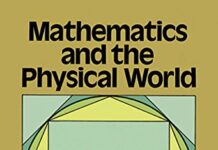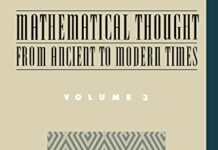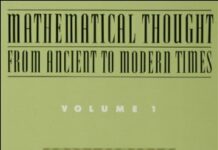
Ebook Info
- Published: 1986
- Number of pages: 263 pages
- Format: PDF
- File Size: 15.08 MB
- Authors: Morris Kline
Description
In this book Kline examines the development of mathematics as our most powerful instrument for exploring the physical world. He probes our existing world of mathematics and illuminates its workings as a science enabling us to penetrate the secrets of the world’s natural phenomena.
User’s Reviews
Reviews from Amazon users which were colected at the time this book was published on the website:
⭐By reading this short book, you will absorb a good foundation in both Mathematics and Physics. You will also acquire an infinite respect for Newton, Maxwell, and Einstein. In all cases, these geniuses developed theories regarding natural phenomena that often could not so readily be observed (if at all).
⭐I wish Prof. Kline would have been my professor! I keep buying his books because he makes Mathematics real. I love this book.
⭐This book is a good book, but it bais becuse it doesn’t show the Arabs Scientist in the Dark Ages. They did some mistake information about greece like when he says ” all greece book dissapered” but the reality is all their book translated to Arabic in Iraq. He also called the numbers we use 1,2,3 not arabic numerial but he keeps it as no evedance. And the indian numbers he said they are Arabic numbers, but the fact that what he mentioned about Arabic numbers are not arabic, but they are indians numbers. I think the book should be updated.
⭐This is by far one of the best science books for the layman I have ever read, and I enjoyed reading it. I especially liked the discussions of the cultural context inwhich Copernicus, Kepler, Galileo, and Newton worked. The break that Copernicus made with common sense AND religous dogma is so great as to boggle the mind even today. And Kepler’s determination that the Earth’s orbit is an ellipse, again defies belief, since it was done before calculus was invented, or the law of Gravity determined.I highly recommend this book to anyone who enjoys a good science read.
⭐This is a good, basic introduction to the history of math, but its promise of engaging philosophical issues falls short. It’s not until Chapter XII that Kline really engages the philsophy of mathematics, but then attempts to cover a lot of ground in a short span, and the distinctions and groupings Kline forms of different thinkers’ conceptions of mathematics leads to strange bedfellows; particularly Kline’s claim that Wittgenstein is basically a mathematical empiricist and yet believes that mathematics is a human creation. To my mind there’s an inherent contradiction there. Most bothersome, however is the almost entire lack of proper footnotes. Some of the most interesting quotes will be difficult (if not impossible) to find b/c Kline only tells us the author of the quote and oftentimes doesn’t even include the author in the bibliography! In particular I’m thinking of a fascinating quote from Evariste Galois – Kline gives no indication of where I can find it! Still, I have to give this book a 4 just b/c it’s a good introduction that reads rather quickly.
⭐This was Morris Kline’s last book, and was published in 1985. He lived from 1908 to 1992.Its major theme is “how mathematics reveals and determines our knowledge of the physical world” (86), and so its major concern is “to describe what is known about the realities of our physical world *only* through the medium of mathematics”. (preface)The book he wrote before this
⭐] (see my review) was concerned with the history of the rational justification of mathematics, and in this book his concern is with the use of mathematics as an instrument or method of knowledge (or scientific knowledge, if you’re inclined to make a distinction). These are both epistemological concerns, and one could ask: what conclusions did Kline settle upon?”Nature neither prescribes nor proscribes any mathematical theory.” (201)”Our mathematical theory of the physical world is not a description of the phenomena as we perceive them but a bold symbolic construction. Mathematics, released from the bondage of sensory experience, no longer describes reality but makes models of reality that serve the purposes of explanation, calculation, and prediction.” (202-03)”We have a science of nature as humanity thinks about and describes it. Science stands between humanity and nature.” (203)”We must face the fact that there is no universally accepted correspondence between mathematics and physical reality.” (210)”[M]athematics is a human activity and is subject to all the foibles and frailties of humans. Any formal, logical account is pseudo-mathematics, a fiction, even a legend, despite the element of reason. […] [M]athematics is no more than the abstract, and only approximate, formulation of experience.” (222)He summarizes these thoughts on page 226:”Because mathematics is a human creation, and because through mathematics we discover totally new physical phenomena, human beings create parts of their universe, gravity, electromagnetic waves, quanta of energy, and so forth. Of course, perceptions and experimentation give leads to the mathematician. There is a substratum of physical fact, but even when there is some physical reality, the full organization, completion, correction, and understanding come through mathematics.”What we know involves the human mind at least as much as what exists in the external world and even in the perceptions the human mind enters. To perceive a tree without recognizing the “treeness” is meaningless. Moreover, a collection of perceptions per se is meaningless. Humans and their minds are part of reality. Science can no longer confront nature as objective and humanity as the describer. They cannot be separated.”The dividing line between mathematical knowledge and empirical knowledge is not absolute. We constantly adjust the records of our observations and at the same time adjust our theories to meet new observations and experimental results. The objective in both efforts is a comprehensive and coherent account of the physical world. Mathematics mediates between man and nature, between man’s inner and outer worlds.”We come finally to the undeniable and irresistible conclusion that our mathematics and physical reality are inseparable.” (226)Thus Kline ends with the conflation of epistemology and ontology.It may be illuminating to note that Kline calls Ludwig Wittgenstein “one of the most profound philosophers of the subject” of mathematics and the physical world, and remarks that he “declared that mathematics is not only a human creation but it is very much influenced by the cultures in which it was developed. Its “truths” are as dependent on human beings as is the perception of color or the English language.” (222)Nowhere in the book does Kline discuss the notion of mathematical structures. He briefly mentions Nicolas Bourbaki without offering any commentary on what he reports. He tells us this “distinguished group of mathematicians […] say that there is an intimate connection between experimental phenomena and mathematical structures. Yet we are completely ignorant about the underlying reasons for this, and we shall perhaps always remain ignorant of them. […] We can think of mathematics as a storehouse of mathematical structures, and certain aspects of physical or empirical reality fit into these structures, as if through a kind of preadaptation.” (224)I found the first eight chapters engaging, and up to that point was ready to give the book top rating. These chapters were focused on actual mathematics in relation to science. Once Kline reached the 20th century the book turned away from its previous focus and became a math-free popularization of relativity and quantum theory, with the addition of an elementary look at a few topics in the philosophy of science.The year after Kline’s book was published, Saunders Mac Lane published
⭐(currently out of print, to the disgrace of Springer-Verlag). Mac Lane’s book is written at a much more sophisticated level, both mathematically and philosophically. Of Wittgenstein’s philosophy of mathematics, Mac Lane remarks: “[T]he philosophy of Mathematics cannot be much advanced by many of the books entitled “Mathematical Knowledge”, in view of the observation that such a title usually covers a book which appears to involve little knowledge of Mathematics and much discussion of how Mathematicians can (or cannot) know the truth. This dismissal applies especially to the later (posthumous) volume of Wittgenstein [1964], where the actual Mathematical content rarely rises above third grade arithmetic, while the actual concern is less with Mathematics than with its use to illustrate some strictly philosophical issue.” (Mac Lane: 444)Related to Mac Lane’s remarks: Kline often disregards the philosophical underpinnings of the many authors he quotes in the final chapters of the book where he’s discussing the relation of mathematics to reality. As much as I respect Morris Kline, I cannot see this book as fully successful. The last five chapters weaken an otherwise interesting report.___________:: Contents ::Historical Overview: Is There an External World?I. The Failings of the Senses and IntuitionII. The Rise and Role of MathematicsIII. The Astronomical World of the GreeksIV. The Heliocentric Theory of Copernicus and KeplerV. Mathematics Dominates Physical ScienceVI. Mathematics and the Mystery of GravitationVII. Mathematics and the Imperceptible Electromagnetic WorldVIII. A Prelude to the Theory of RelativityIX. The Relativistic WorldX. The Dissolution of Matter: Quantum TheoryXI. The Reality of Mathematical PhysicsXII. Why Does Mathematics Work?XIII. Mathematics and Nature’s BehaviorBibliographyIndex
⭐That book is excellent, enjoyable reading for people with average experience in mathematics who are interested in its origin, background and history. The author is quite a master to develop and to present material in intriguing, involving way, with great respect to masters of the past. I knew this book for long ago, and now I decided to re-read it again. Wonderful ! Very recommended.
Keywords
Free Download Mathematics and the Search for Knowledge in PDF format
Mathematics and the Search for Knowledge PDF Free Download
Download Mathematics and the Search for Knowledge 1986 PDF Free
Mathematics and the Search for Knowledge 1986 PDF Free Download
Download Mathematics and the Search for Knowledge PDF
Free Download Ebook Mathematics and the Search for Knowledge




